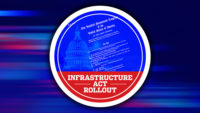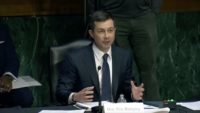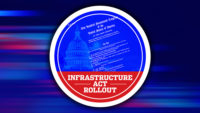In an apparent end to a months-long tussle, the Federal Highway Administration has issued a guidance memorandum that makes it clear that each state has the principal role in deciding how to spend the billions of federal road and bridge dollars from the Infrastructure Investment and Jobs Act that are distributed by formula.
The memo, issued Feb. 24, replaces a controversial December 2021 FHWA guidance document that congressional critics said put too much emphasis on using IIJA formula funds on projects to maintain roads and bridges and de-emphasized construction projects that increased highway capacity, such as new roads or additional lanes.
The memo from new FHWA Administrator Shailen P. Bhatt says that, as mandated by federal law, “states determine which of their projects shall be federally financed by federal-aid highway formula dollars.”
Bhatt, who previously led the Delaware and Colorado departments of transportation, adds, “Different states have different needs when it comes to transportation assets that must be reconfigured and modernized, expanded and added or retired and replaced.”
Bhatt’s memo also notes that while "states are ultimately responsible for deciding how formula funds are allotted to projects," the agency will still advocate for Biden administration policies and priorities. These include improving the “condition, resilience and safety” of roads and bridges, improving safety for all road users, addressing highway projects' environmental impacts–including stormwater runoff and greenhouse gas emissions–and reconnecting neighborhoods cut off from jobs or health care by old highways or other types of infrastructure.
Bhatt, who was sworn in to the top FHWA job on Jan. 13, also points out that the agency is placing “important recognition" on carrying out the One Federal Decision framework for speeding up infrastructure project reviews, a Trump administration executive order that the IIJA codified.
Two leading congressional critics of the 2021 memo—Sen. Shelley Moore Capito (R-W.Va.) and House Transportation and Infrastructure Committee Chairman Sam Graves (R-Mo.)—hailed the FHWA action.
In a joint statement, Moore Capito, the top Republican on the Environment and Public Works Committee, and Graves said, “Today is a win for states, communities and millions of Americans who stand to benefit from the flexibility provided in the Infrastructure Investment and Jobs Act."
They added, “By issuing a revised memorandum, FHWA admitted that it was wrong in ... attempts to undo the flexibility provided to states in the law by establishing preferences for certain policies and projects.”
Senate Environment and Public Works Committee Chairman Tom Carper (D-Del.) also welcomed the new memo. “This policy memo highlights the critical need to improve safety, equity and sustainability on our roads, while also reaffirming the rights of states to choose how they fund their transportation projects,” Carper said in a statement.
“I hope that their updated guidance can help alleviate any concerns as we continue working together to address our nation’s infrastructure needs,” he added.
Moore Capito and other critics repeatedly raised the issue of the December guidance with administration witnesses at congressional hearings, including Bhatt's confirmation hearing before Carper's committee, last September.
Last December, Moore Capito said she planned to introduce a resolution under the Congressional Review Act (CRA) to try to strike down the 2021 memo.
But “in light of the news, Senator Capito is not planning to file a CRA resolution of disapproval at this time,” a Senate aide said via email.
“I think it’s an improvement in that you don’t have mixed messages and you have clarity that states, for formula dollars, have the ultimate authority to decide what projects to advance,” says Dave Bauer, American Road & Transportation Builders Association CEO, about the FHWA guidance.
“That sentiment was in the December 2021 memo but it was also juxtaposed with their advancement of their policy priorities—which is an emphasis on existing facilities,” Bauer told ENR in an interview.
Brian Turmail, Associated General Contractors of America vice president of public affairs and strategic initiatives, said via email, “The superseding guidance issued by Administrator Bhatt reflects existing law, and provides clarity that states still have the ultimate authority to decide which projects to move forward with.
“We are happy to have this needless distraction behind us and appreciate that the administration has opted to heed our calls to replace its earlier, misguided, memo," Turmail added.
Bauer says, "Now we can focus on delivering the benefits that were intended from the infrastructure law."





